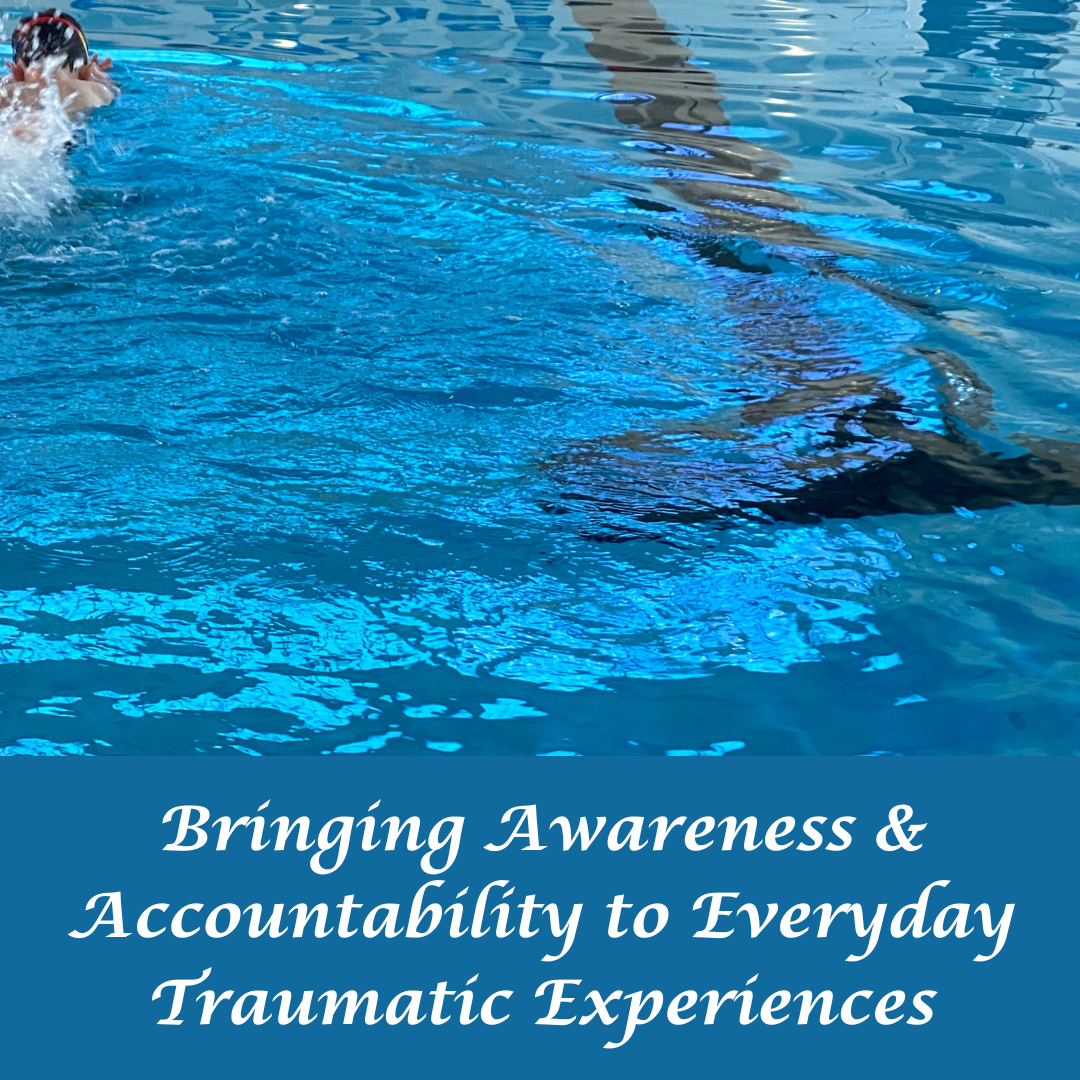Bringing Awareness & Accountability to Everyday Traumatic Experiences
Many years ago, my eldest son went to swimming lessons. There were a few instructors that were amazing with the children. Unfortunately, one day we turned up and witnessed an instructor from another class causing trauma to a 3 year old. I stood in shock as I witnessed this swim instructor hold this terrified little girl on her back in the middle of the pool.
Even worse, she was yelling at this child "shush be quiet, you're making a big deal of nothing. Your crying is not allowed. I will not take you back to the edge of the pool until you do this back float. So get over it and stop crying."
My son was frozen in place as he observed the events unfolding, "I never want her as a swimming instructor, she's really mean."
I replied, "Don't worry, if any swim instructor does anything either of us is unwilling for, I will pull you out of the pool immediately."
Over the next few weeks I observed her in similar acts that contributed to trauma for various children.
A few weeks later, we turned up to lessons, and my son's usual swim instructor was away.
Guess who was there instead?
Yes, that same woman who traumatised that little girl, and countless other children.
I told the receptionist that my son would not be participating in her class. She asked me why, and I told her what I had observed.
She then started gaslighting me, that I had misinterpreted what I saw, and they would never allow an instructor to do that.
I unenrolled my son from that swim school altogether.
Fast forward several years:
For the past couple of weeks, I have been observing my 7 year old as he starts swimming lessons for the first time in his life. Up until recently, he wasn't allowed into a pool because of a previous life-threatening medical condition.
After everything that occurred with our previous traumatising experiences with swimming lessons, we chose a different swim school.
I made sure that I observed each of my children's swim instructors before enrolling them into lessons.
They both treated the children in their class with respect and compassion.
However, again I observed this other swim instructor teaching the class next to my son, doing something to a child that might cause stress.
Last week, this little boy didn't feel comfortable doing some of the activities.
She replied to him in a harsh voice "You are not allowed to say no, in my class. You have to do everything I tell you. Do not say no to me again!"
She then proceeded to force him to do all activities, including putting his head under water, and floating on his back.
I left feeling dread and sadness.
This week, I sat and observed a similar unfolding of events.
This same swim instructor held another little boy in the middle of the pool, in tears as he squirmed to get away.
She raised her voice, "I said you will do a back float, and you will do it without tears. Here hold this ball while you float." She roughly thrust a small ball into his arms.
He cried more, his body becoming heavy with the ragged heaves of terror.
She finally moved him back to the edge of the pool in disgust.
The little boys mother, reached out her hands and invited her child to come out of the pool into her comforting embrace.
The swim instructor looked on, "he's being very difficulty today. Remember I don't allow noes in my class."
The mother looked uncomfortable. She took her son over to the other edge of the pool, squatted down to his level and tried to talk to him. By this stage her son felt so unsafe, he entered flight mode and started to kick her. She remained calm, squatting next to him.
A few moments later, she stood, walked back to their belongings, picked them up and took her son home. Her son had been in the water less than 10 minutes.
While this was all occurring, I watched as a similar thing was unfolding in my son's swim class, only a few metres away, with a little girl.
This little girl was crying and stating she wasn't ready to do the activity.
The swim instructor held that little girl lovingly in her arms, hugging her, listening and comforting her.
The little girl looked up at her after shedding some tears, smiled and said she was ready to kick across the pool.
How very similar these children behaved, and how very different these swim instructors responded.
The little girl from years ago, and the little boys from the swim classes last week and this week, would have left those classes feeling traumatised, stressed, overwhelmed, powerless, and helpless. It would not surprise me at all, if any or all of these children developed a fear of swimming or water in general.
Trauma-Inducing Systems
Our actions towards children can have severely traumatic impacts on their development, both in the present and sometimes decades into the future.
From my observations at swimming lessons, in the school system, child care centres, hospitals, dentists and most other areas of society, I can say with absolute certainty that traumatisation is running rampant.
Most of these places are not trauma-informed. Instead they create trauma.
These systems (education, medical, sporting, etc) not only exceedingly create traumatic experiences for children, they also hold no accountability for their role in the trauma they inflict on these children. Furthermore, they have no policies or practices in place to assist children who have been traumatised or stressed.
Is it any wonder, that childhood anxiety, depression and suicide continues to rise EVERY SINGLE YEAR?!?!
Being Trauma-Informed
One of my deepest passions, and lifelong missions is to create trauma-informed, safe, healing spaces for children.
I do that everyday with my Family Day Care I co-run with my husband.
I am a trauma-informed Counsellor, supporting many parents across the world. As a side note, many Psychologists, Counsellors, Doctors and other Professional Therapist are sadly NOT trauma-informed.
As of December, I will also be a Child-Centred Play Therapist, which is one of the rare therapies that is child-directed and so so so healing.
The purpose of this article is not only to share my experiences and observations, but also to bring awareness to people, events and circumstances that can lead a child to experiencing trauma.
When we think of 'trauma' many of us think of abuse, neglect, sexual harm, domestic violence, warzones, fatal accidents, death of a loved one. All of these are obviously traumatic and will involve healing.
However, there are also smaller, more everyday traumas. Dr Gabor Mate calls these small 't' traumas. These look like forcing children to do things against their will when safety is not an issues; school traumas such as bullying, yelling teachers, academic failure and comparison; being separated from a primary caregiver such as drop off at daycare; a child's needs not being met; punishments such as timeouts, smacking; plus more.
When we have more knowledge, then it offers us space to have more respectful, compassionate responses and practices that can avoid traumas and heal ones that are beyond our control, like school trauma.
Children are extremely intuitive, they can read the energy of us and other people quite well.
If your child is ever communicating with you that they don't like someone or don't want to participate in an activity, get curious.
It's a cultural norm for us to force children to do things, "but you always love coming;" "you'll get used to it;" "it's not that bad." All these invalidate what a child is feeling and thinking, and they will shutdown and become increasingly uncooperative.
We can offer them space and empathy.
Let them know that you are willing to listen to all that is coming up for them. Sometimes, it might be a matter of them being tired after a long day, have unmet needs like hunger, or accumulated feelings. In which case, meeting all of those needs means they will become cooperative again because it was never the person or activity that was the issue.
If on the other hand, it does relate to the person/activity, then it may be worth reflecting:
what is the reason my child is resistant?
can I remain curious and compassionate, to hear what my child is telling me? (note: not all children will talk about it, remember behaviour is also a form of communication)
is there a way I can support my child with this by approaching the person to inform them of the concerns?
does my child actually have to do this activity/interact with this person?
can I source an alternative?
would it be best to go elsewhere/find a new person?
If something doesn't feel right for you or your child, then generally it isn't.
Trust yourself.
Trust your child.
Choose what is best for both of you.
Even if that means going against your social or cultural norms.
Your child's wellbeing (physical, mental, spiritual, emotional, secure attachment) is the most important thing to their development.
If you need support on your parenting journey please feel free to reach out.
If your child is needing support, I offer Play Therapy in-person in Toowoomba or TelePlay sessions via Zoom.
So much love and compassion to any big feelings that have arisen for you as you have read this.
Remember, take what resonates, and leave the rest on this webpage.
Recommended Reading:
Healing Your Traumatised Child by Aletha Solter PhD
The Myth of Normal by Gabor Mate MD
The Body Keeps the Score by Bessel Van Der Kolk

